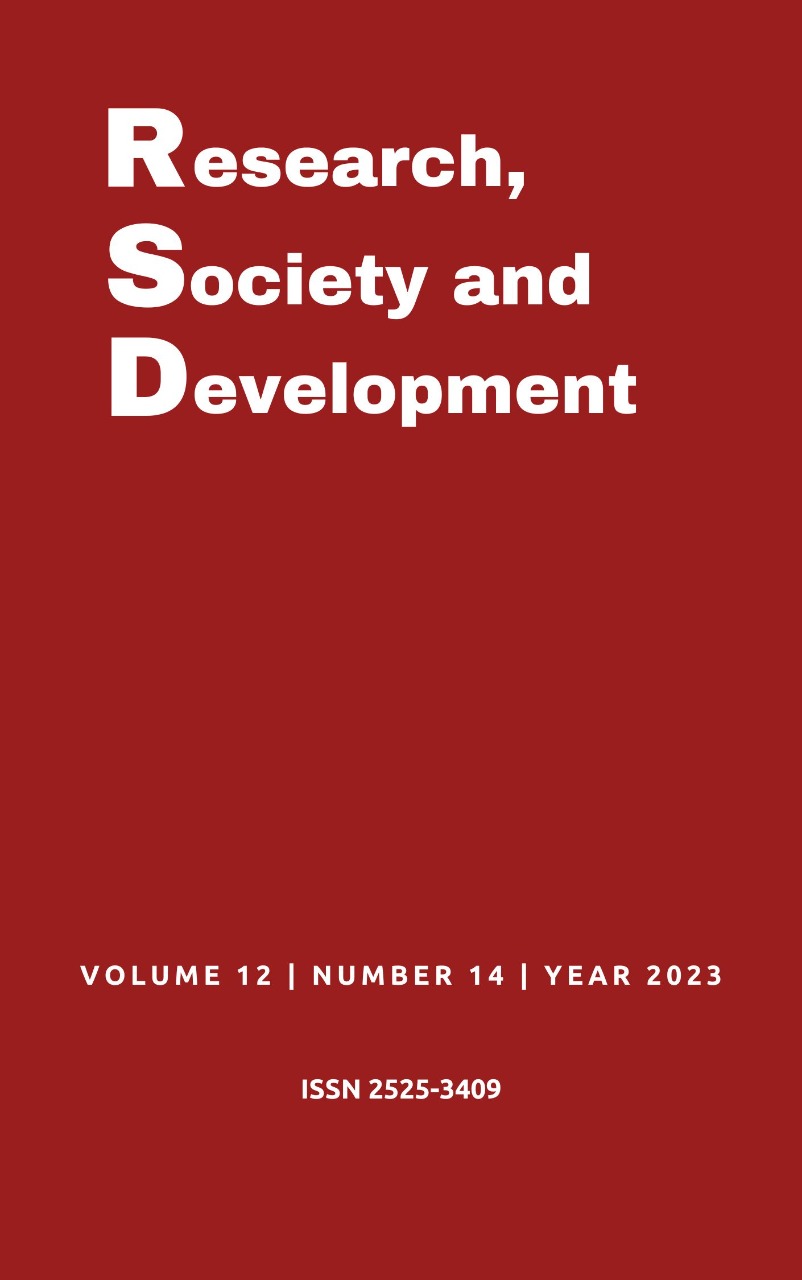The role of struggles in combating depression and anxiety: An integrative review
DOI:
https://doi.org/10.33448/rsd-v12i14.44434Keywords:
Fights, Depression, Anxiety, Martial arts.Abstract
Analyze, based on literature, the role of struggles in combating depression and anxiety. This is an integrated review of the literature, carried out by searching for studies in national and international databases: Latin American and Caribbean Literature in Health Sciences (LILACS), Nursing Database (BDENF) and Medical Literature Analysis and Retrieval System Online (MEDLINE). The final sample consisted of 4 published studies. Results and Discussions: After crossing the definitions and applicability of the inclusion and exclusion process, a discussion was held based on 4 studies. It is concluded that martial arts have the potential to play a significant role in promoting mental health and combating depression and anxiety. However, it is essential that individuals interested in fighting seek appropriate guidance and consider it as part of a comprehensive mental health care plan. Furthermore, more research and studies are needed to deepen our understanding of the benefits of martial fighting in this context.
References
American Psychiatric Association (APA). (2014) Manual diagnóstico e estatístico de transtornos mentais: DSM-5. (5a ed.), Artmed.
Araújo, T. M., Júnior, J. de J. C., Almeida, M. M. G., & Pinho, P. de S. (2007). Prática de atividades de lazer e morbidade psíquica em residentes de áreas urbanas. Revista Baiana de saúde pública. 31(2), 294-310.
Buckworth, J. & Dishman, R. K. (2022). Psicologia do Exercício. (4a ed.), Cinética Humana.
Carr, A. & Mcnulty, M. (2014). O Manual de Psicologia Clínica de Adultos: Uma Abordagem Prática Baseada em Evidências. Routledge.
Cheik, N. C., Reis, I. T., Heredia R. A., Lourdes Ventura, M., Tufik, S., Antunes, H. K., et al. (2008). Efeitos do exercício físico e da atividade física na depressão e ansiedade em indivíduos idosos. Rev Bras Ciênc Mov. 11(3): 45-52.
Cheng, L., Qian, L., Chang, S., & He, B. (2021) Effect of Tai Chi on depression symptoms and sleep quality among older adult women after exercise cessation. Res Sports Med. 29(4):395-405. 10.1080/15438627.2020.1870976.
Del Vecchio, F. B., Silva, J. J. R., & Farias, C. B. (2017) Temporal analysis of national level Muay-Thai matches: Effects of competitive phase. Revista De Artes Marciales Asiáticas. 10(1), 34–41. https://doi.org/10.18002/rama.v10i1.1635.
Field, T., Diego, M., Delgado, J., & Medina, L. (2013). Tai chi/yoga reduces prenatal depression, anxiety and sleep disturbances. Complement Ther Clin Pract. 19(1):6-10. 10.1016/j.ctcp.2012.10.001.
Gil, A.C. (2019) Métodos e técnicas de pesquisa social. (5a ed.), Atlas.
Gomes, . C. S., Lemos, S. R. & Costa, J. M. (2023). Ansiedade e depressão e sua relação com a imagem corporal em estudantes de educação física: Anxiety and depression Symptoms and their relationship with body image among physical education students. Cadernos Brasileiros de Saúde Mental/Brazilian Journal of Mental Health. 15 (43), 1-13.
Jones, G.., Hanton, S., & Connaughton, D. (2007). Uma estrutura de resistência mental nos melhores desempenhos do mundo. Psicol do Esporte. 21 243–264.
Kongkaew, C., Lertsinthai, P., Jampachaisri, K., Mongkhon, P., Meesomperm, P., Kornkaew, K., & Malaiwong, P. (2018) The Effects of Thai Yoga on Physical Fitness: A Meta-Analysis of Randomized Control Trials. J Altern Complement Med. 24(6):541-551. 10.1089/acm.2017.0257.
Machado, R. S., & Mello-Carpes, P. B. (2018). Redução do estresse e ansiedade na escola por meio do tai chi chuan. Revista Ciência Em Extensão , 14(3), 64–78.
Marconi, A., & Lakatos, E. (2015). Fundamentos de Metodologia Científica. (6a ed.), Atlas.
Mendes, K. D. S., Silveira, R. C. de C. P., & Galvão, C. M. (2008). Revisão integrativa: método de pesquisa para a incorporação de evidências na saúde e na enfermagem. Texto & Contexto - Enfermagem, 17(4), 758–764. https://doi.org/10.1590/s0104-07072008000400018.
Moraes, M. C. F., & Da Silva, N. P. (2015) Saúde mental e as relações de trabalho: como a ansiedade influencia o comportamento humano no ambiente de trabalho. Interfaces de Saberes, 14(1).
OMS. (2020). Organização mundial de saúde. Relatório sobre a saúde no Oxford.
Solianik R., Mickevičienė D., Žlibinaitė L., & Čekanauskaitė A. (2021). Tai chi improves psychoemotional state, cognition, and motor learning in older adults during the COVID-19 pandemic. Exp Gerontol. 150:111363. 10.1016/j.exger.2021.111363.
Souza, de M. T., Dias Da Silva, M., & De Carvalho, R. (2010). Revisão integrativa: o que é e como fazer Integrative review: what is it? How to do it? 8(1).
Wanjau M. N,, Möller H., Haigh, F., Milat, A., Hayek, R., Lucas, P., & Veerman, J. L. (2023). Physical Activity and Depression and Anxiety Disorders: A Systematic Review of Reviews and Assessment of Causality. AJPM Focus. 2(2):100074. d10.1016/j.focus.2023.100074.
Willing, A. E., Girling, S. A., Deichert, R., Wood-Deichert, R., Gonzalez, J., Hernandez, D., Foran, E., Sanberg, P. R., & Kip, K. E. (2019) Brazilian Jiu Jitsu Training for US Service Members and Veterans with Symptoms of PTSD. Mil Med. 2019 Dec 1;184(11-12): e626-e631. 10.1093/milmed/usz074.
Zuntini, A. C. S., et.al. (2018). Atividades e Exercícios físicos nos Transtornos Psicológicos. Revista Científica Multidisciplinar Núcleo do Conhecimento. 3 (1), 97-115.
Downloads
Published
Issue
Section
License
Copyright (c) 2023 Victor Pereira Dib; Felipe Oliveira da Silva; Aluísio Avelino Pinto

This work is licensed under a Creative Commons Attribution 4.0 International License.
Authors who publish with this journal agree to the following terms:
1) Authors retain copyright and grant the journal right of first publication with the work simultaneously licensed under a Creative Commons Attribution License that allows others to share the work with an acknowledgement of the work's authorship and initial publication in this journal.
2) Authors are able to enter into separate, additional contractual arrangements for the non-exclusive distribution of the journal's published version of the work (e.g., post it to an institutional repository or publish it in a book), with an acknowledgement of its initial publication in this journal.
3) Authors are permitted and encouraged to post their work online (e.g., in institutional repositories or on their website) prior to and during the submission process, as it can lead to productive exchanges, as well as earlier and greater citation of published work.


